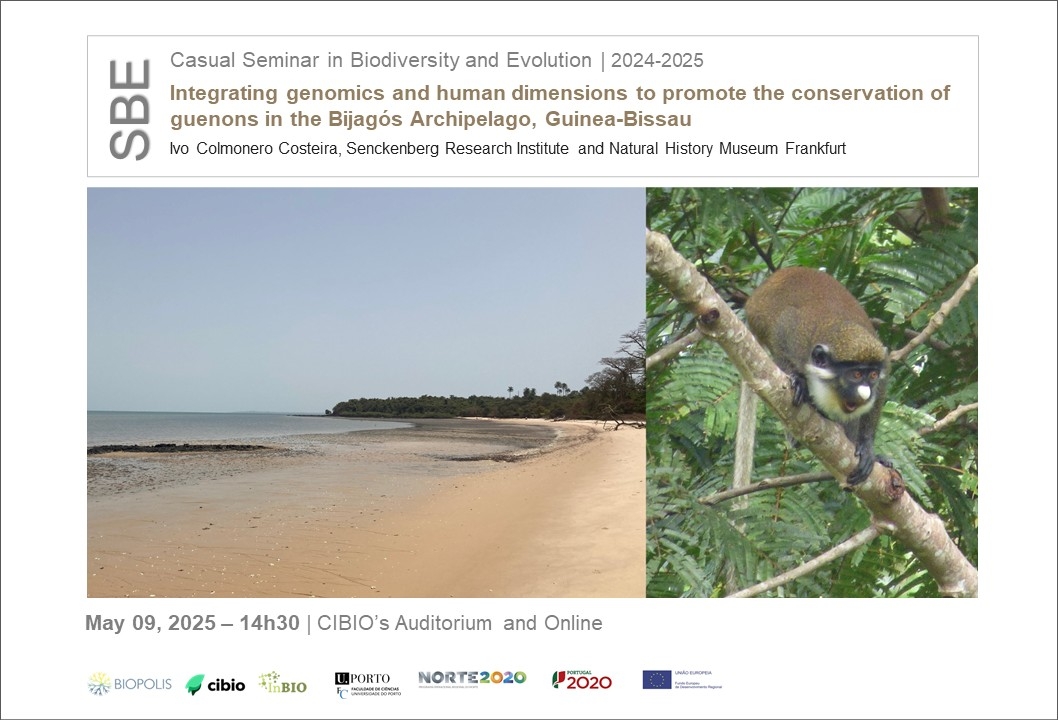Integrating genomics and human dimensions to promote the conservation of guenons in the Bijagós Archipelago, Guinea-Bissau
09 May 2025 - Ivo Colmonero Costeira, Senckenberg Research Institute and Natural History Museum Frankfurt | 14h30 | Hybrid Seminar

REGULAR SEMINAR IN BIODIVERSITY AND EVOLUTION
Effective wildlife conservation requires more than biology-derived data—it requires an integrated understanding of the people who share landscapes with wildlife. In the Bijagós Archipelago, Guinea-Bissau, this approach is especially critical. The Bijagó ethnic group lives in insularity and depends heavily on non-timber forest products and small-scale agriculture. Consequently, their livelihoods are particularly vulnerable to crop-raiding species such as the three guenons they coexist with: the spot-nosed monkey (Cercopithecus petaurista), Campbell’s monkey (Cercopithecus campbelli), and the green monkey (Chlorocebus sabaeus). Of these, the spot-nosed monkey is of particular conservation concern. Likely extirpated from the mainland, its insular populations may represent the species’ stronghold in Guinea-Bissau. To inform conservation efforts, we applied a combination of multispecies population genetics and genomics to assess key genetic parameters. Results revealed patterns typical of insular populations: strong genetic differentiation, elevated inbreeding, and reduced genetic diversty and effective population sizes. While we found no immediate threat from increased mutational load, these populations remain vulnerable to the cumulative effects of inbreeding, genetic drift, and increased hunting. Furthermore, we explored the perceptions and attitudes of the Bijagó towards guenons. Unexpectingly, attitudes and percepitons were predominantly negative, driven by guenons’ crop-raiding behaviour. However, their recognised utilitarian value suggests there is potential for community support of future conservation efforts if these initiatives effectively translate into socio-economic benefits for the local populations. This seminar aims to show how integrating genetic/genomic data with social attitudes and perceptions can inform conservation strategies that are both effective and equitable.
Ivo Colmonero Costeira holds a PhD in Biosciences and is currently a postdoctoral researcher at the Genomic Biomonitoring section of the Senckenberg Research Institute and Natural History Museum Frankfurt, Germany. His research focuses on macrogenetics, population genomics, and primatology, with particular interest in how global patterns of intraspecific genetic variation (IGV) can inform the development of conservation-relevant genetic indicators—especially in naturally small, isolated systems, and long-lived species such as primates, which often fall as outliers to the multi-species models. Interested in contributing to conservation policy and practice at both global and local levels, ICC has also worked to bridge the gap between biological and human dimensions to conservation.
[Host: Maria Joana Ferreira da Silva, Biodiversity of Deserts and Arid Regions - BIODESERTS]
Zoom Link: https://videoconf-colibri.zoom.us/j/99797933081
Zoom Link: https://videoconf-colibri.zoom.us/j/99797933081